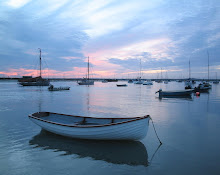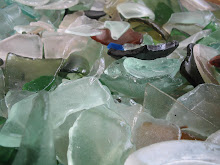 Should it happen to be your birthday today, you share it with one of my favourite poets – Emily Dickinson , born 10 December 1830.
Should it happen to be your birthday today, you share it with one of my favourite poets – Emily Dickinson , born 10 December 1830. I’ve known some of Dickinson’s poems for years, but have only recently worked my way through the Complete Works - in fact, I haven’t quite finished yet. (As an Eng. Lit. girl, I'm probably a bit of a late-starter in this respect, to say the least.)
I’ve known some of Dickinson’s poems for years, but have only recently worked my way through the Complete Works - in fact, I haven’t quite finished yet. (As an Eng. Lit. girl, I'm probably a bit of a late-starter in this respect, to say the least.)Because she’s on my ‘currently reading’ pile, she is constantly to hand on my bedside bookcase. But even when I’ve moved on to other books, there, by my bedside, she will be staying, along with my other favourite ‘dip into’ books.
 I’ve found so much in her work that is exquisitely evocative and moving and personal. For anyone who’s a bit ‘scared’ of poetry, one of the best things about her work is that Emily Dickinson is often regarded as ‘coming from nowhere’. She doesn’t belong to any school or tradition of poetry, she simply ‘appeared’. And I wonder whether this doesn’t explain in large measure why her poems – 150 years old – seem so fresh and accessible and have gained her such a huge following. Her poems are completely timeless, it seems to me. Many of them could have been written yesterday. And when you see her handwritten versions, with their incomplete rhymes and unconventional punctuation (she was a great user of dashes and odd capitalisation) – they seem so spontaneous and full of life.
I’ve found so much in her work that is exquisitely evocative and moving and personal. For anyone who’s a bit ‘scared’ of poetry, one of the best things about her work is that Emily Dickinson is often regarded as ‘coming from nowhere’. She doesn’t belong to any school or tradition of poetry, she simply ‘appeared’. And I wonder whether this doesn’t explain in large measure why her poems – 150 years old – seem so fresh and accessible and have gained her such a huge following. Her poems are completely timeless, it seems to me. Many of them could have been written yesterday. And when you see her handwritten versions, with their incomplete rhymes and unconventional punctuation (she was a great user of dashes and odd capitalisation) – they seem so spontaneous and full of life. And yet, she was for the greater part of her life a recluse – the ‘Woman in White’ – who shied away from company and even from leaving the house at all.
And yet, she was for the greater part of her life a recluse – the ‘Woman in White’ – who shied away from company and even from leaving the house at all.How the words of a woman who saw hardly anyone, went hardly anywhere and, as far as is known, never consummated any of her loves, can be so alive, so direct and so bursting with meaning for contemporary readers remains a mystery. The enigma of the woman helps make her more accessible. There is so much there that is unknown, obscure, unresolved, that one reader’s response and guess at the true meaning of a Dickinson poems is as good as anyone else’s.

While providing vast trough-loads of fodder for academics, she has largely resisted their attempts to explain and confine her. And this she shares with another out-of-nowhere 'Great' – Shakespeare. You could spend your life analysing her work (and indeed millions have), but you’d never nail down that essential ‘yes’-ness which leaps into the reader’s heart when reading certain poems.
And so I’m not at all bothered by the fact that I don’t understand some of her poems, and find scholarly analysis of her rhyming structures (which, incidentally, until surprisingly recently, her editors ‘improved’ before publication) ultimately irrelevant. I don’t really care to explore what makes her poems ‘work’ – I simply know that certain of them tick to the beat of my heart, speak with a voice that I recognise.
Happy Birthday, Emily, and thank you for leaving us your poems (even though you probably didn’t mean to).
Here are a few of my favourites:
THERE is no frigate like a book
To take us lands away,
Nor any coursers like a page
Of prancing poetry.
This traverse may the poorest take
Without oppress of toll;
How frugal is the chariot
That bears a human soul!
YOU left me, sweet, two legacies,—
A legacy of love
A Heavenly Father would content,
Had He the offer of;
You left me boundaries of pain
Capacious as the sea,
Between eternity and time,
Your consciousness and me.
WILD nights! Wild nights!
Were I with thee,
Wild nights should be
Our luxury!
Futile the winds
To a heart in port,—
Done with the compass,
Done with the chart.
Rowing in Eden!
Ah! the sea!
Might I but moor
To-night in thee!
I STARTED early, took my dog,
And visited the sea;
The mermaids in the basement
Came out to look at me,
And frigates in the upper floor
Extended hempen hands,
Presuming me to be a mouse
Aground, upon the sands.
But no man moved me till the tide
Went past my simple shoe,
And past my apron and my belt,
And past my bodice too,
And made as he would eat me up
As wholly as a dew
Upon a dandelion’s sleeve—
And then I started too.
And he—he followed close behind;
I felt his silver heel
Upon my ankle,—then my shoes
Would overflow with pearl.
Until we met the solid town,
No man he seemed to know;
And bowing with a mighty look
At me, the sea withdrew.
There’s so much available on the internet about Emily Dickinson’s life and works, that it’s pretty pointless trying to give a potted version here. There's a huge collection of useful resources here , and her complete poems are available available online here . There’s a fantastic collection of links here for anyone who wants to delve further.





















2 comments:
With you 100 per cent on Emily Dickinson. She is, not surprisingly, today's poet of choice on the Writer's Almanac website at http://writersalmanac.publicradio.org/programs/2007/12/10/index.html e, where Garrison Keillor has posted 'The Last Night that She Lived'. Not a cheerful subject but exquisitely written.
Fascinating - and thanks, I'd not discovered the Writer's Almanac before - an excellent site.
Post a Comment